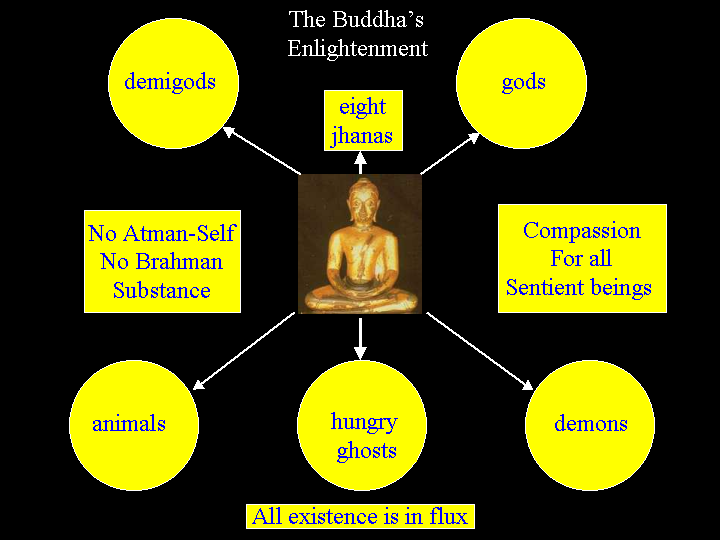

THE BUDDHA'S ENLIGHTENMENT
FIRST WATCH (of the night) - retrocognition--recalling former births (1,000s of them). Jataka stories recounts 550.
Philosophical discovery of the First Watch: the world is in constant flux. There are no enduring substances at all. The Buddha finds no evidence for "substance" metaphysics. "Materialism" is a form of substance metaphysics; it is the belief that at the base of all things and events there is a substance called matter, eternal, unchanging, never can be destroyed or created. Many Hindu philosophers went to the opposite extreme, claiming that an immaterial substance (Atman=Brahman) is the fundamental reality. It, too, is enduring, immutable, and eternal--but it is pure spirit rather than matter. Another philosophy called "dualism" combines both material and immaterial substances into one view. Examples are Descartes in the West and Samkhya-Yoga and Jainism in India.
"Process" philosophy--Heraclitus (500 BCE), 20th Century: Whitehead and Hartshorne. The Buddha joins this philosophical tradition and its rejection of all kinds of substance. Contemporary physics appears to conform better to process philosophy rather than substance metaphysics.
SECOND WATCH - attained use of the Third Eye - verified the Law of Karma, surveyed the five places of rebirth: (1) heaven, (2) realm of the Titans, (3) hungry ghosts, (4) hell, (5) animal, (6) human.
Again, the Buddha confirmed the nonsubstantiality of the universe.
The Buddha's emotional response throughout the night is one of great compassion for the suffering that he has witnessed.
THIRD WATCH - discovers the twelve-fold chain of causation and the principle of interdependent coorgination. If there are no independent substances then every thing must be dependent on every other thing.
Doctrine of interdependent coorigination. Pratityasamutpada. Pratit meaning "to depend on" and samutpada meaning "origination." This principle eliminates two possibilities: (1) that things arise from nowhere; and (2) things are created by a creator God. (See the Dalai Lama, The Four Noble Truths, p. 13.) Of course the main point of interdependent coorigination is that no thing is independent, no thing causes itself or has a nature apart from relations with other things.
Substances are externally related, but the entities of Buddha's world are internally related. A B vs. A<=>B. Note the lack of arrows of relation for external relations. A substance has no relations--i.e., relations that will change its being vis-a-vis other things. The "classical" (1600-1900) atom, for example, undergoes no change, but contemporary physics has observed changes and indeterminacies at the most basic level.
The Buddha passed through the eight stages of Dhyana (Pali: Jhana) and reached Nirvana "with substrate"--i.e., while still occupying a body. See the account of the experience of these eight stages at the Buddha’s death (Stryk, pp. 45-46; 234-36). Please note that the highest jhana is called "removal of defiling impulses" still involves the perception of individual karmic acts.
He also discovered that there was "no self," i.e., no ATMAN, a substantial enduring self, the "Higher" Self, which the Buddha rejected. The Buddha never rejected the Indian idea of the empirical self, usually called jiva. This self is a relationship of body, feeling, perception, disposition, and consciousness. The five SKANDHAS.
FOURTH WATCH (dawn is breaking)
Celestial events take place. Siddhas, perfect beings, shining in the sky. (Note that these beings are higher than the gods, who are still longing for salvation; how are they different, though, from the Buddha?) Flowers fell from the sky. Hindu Gods Indra and Brahma came to pay him homage. They are present at his birth, too. He remained under the Bodhi Tree for seven days.
"Here I have found freedom!" is the best description of Nirvana with substrate. It is a freedom from craving and an acknowledgment that ordinary desires are OK.
Here is a passage from the Pali Canon after the Buddha's Enlightenment.
I have heard that on one occasion, when the Blessed One was newly Awakened -- staying at Uruvela by the banks of the Nera˝jara River in the shade of the Bodhi tree, the tree of Awakening -- he sat in the shade of the Bodhi tree for seven days in one session, sensitive to the bliss of release. At the end of seven days, after emerging from that concentration, he surveyed the world with the eye of an Awakened One. As he did so, he saw living beings burning with the many fevers and aflame with the many fires born of passion, aversion, and delusion. Then, on realizing the significance of that, he on that occasion exclaimed:
This world is burning.
Afflicted by contact,
it calls disease a "self."
By whatever it construes [things],
that's always otherwise.
Becoming otherwise,
the world is
held by becoming
afflicted by becoming
and yet delights
in that very becoming.
Where there's delight,
there is fear.
What one fears
is stressful.
This holy life is lived
for the abandoning of becoming.
Whatever priests or contemplatives say that liberation from becoming is by means of becoming, all of them are not released from becoming, I say.
And whatever priests or contemplatives say that escape from becoming is by means of non-becoming, all of them have not escaped from becoming, I say.
This stress comes into play
in dependence on all acquisitions.
With the ending of all clinging/sustenance,
there's no stress coming into play.
Look at this world:
Beings, afflicted with thick ignorance,
are unreleased
from delight in what has come to be.
All levels of becoming,
anywhere,
in any way,
are inconstant, stressful, subject to change.
Seeing this -- as it's actually present --
with right discernment,
one abandons craving for becoming,
without delighting in non-becoming.
From the total ending of craving
comes fading & cessation without remainder:
Unbinding.
For the monk unbound,
through lack of clinging/sustenance,
there's no further becoming.
He has vanquished Mara,
won the battle.
Having gone beyond all levels of being,
he's Such."Surveying the World" Udana III.10 Loka Sutta, trans. John Ireland (http:world.std.com/~metta) under Pali Canon.